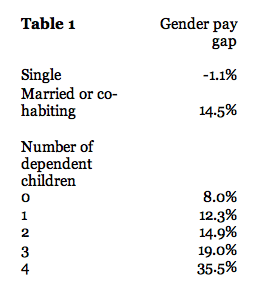This article is more than 1 year old
Why is it that women are consistently paid less than men?
Assuming that what we're told is correct, that is ...
Pregnant pause
We can also test this in another manner, by looking at cross country comparisons for the gender pay gap. Here are the EU figures, and it's notable that the raw gap (i.e., that 77 cents idea) is pretty much the same for the UK and such hotbeds of gender equality as Sweden, Norway and Iceland.
One extraordinary outlier is Italy, with a gap near one third of those countries and it's really difficult to think of that as a country outstanding in its gender equity compared to the Nordics. The explanation is that it's most unusual for a married Italian woman to work, especially once she's had kids.
Thus, rather than going back to work at lower wages to offset the desires of schedules and time off and so on, they just never do re-enter the workforce. Those that do tend to be the upper middle classes working in careers, thus dragging up the average wages.
We can also now explain Harman's claim of a 37 per cent part-time gender pay gap in the UK. The actual part-time pay gap between men and women is in favour of women. If we measure women who work part-time and men who work part-time (everyone here is working from those ASHE numbers).
But all part-time workers make less than all full-time workers ... well, not quite all, but the averages certainly work out that way. So, what Harman did was calculate the wages of part-time women with respect to full-time men.
That's a calculation that led to Sir Michael Scholar, the statistics board bod, rapping her over the knuckles for being misleading.
It is of course possible to be mischievous on this subject, as I once was for The Guardian. This was back in the days when that newspaper would occasionally bring in someone to poke the readers with a pointy stick.
I noted that, yes, there was this motherhood pay gap. But don't worry, because society already offers child tax credits and child benefit, the two amounting to about what that motherhood pay gap was. So, mothers are already being compensated. But agreed, that really is pointy stick through the bars stuff.
I would also point out that I've been offering this rough analysis around for some years now, and I know which political activist I convinced that at least part of the problem lies in maternity leave and maternity pay. Mothers do take time off to care for the little darlin's, this does interrupt careers and this will be an explanation for some of the subsequent pay gap.
The political activist in question persuaded Lib Dem and former deputy PM Nick Clegg of this and that's why the country now has paternity leave, so that it becomes at least somewhat a parents' pay gap, not a motherhood one.

Taken from Table 1 on page 23 of the Office For National
Statistics' 2009 report The gender pay gap in the UK.
Image credit: Mark Wadsworth
Perhaps not quite the policy choice I would have made (“Suck it up, honey!” being more my attitude, you want the blessing of children then there's costs that go with them) but it is at least a policy that starts from the reason for the numbers being as they are and then attempts to change the outcome sensibly.
As best we can tell from the numbers available to us there's somewhere between a very small and no “gender pay gap” in the sense of women being paid less than men simply because they're women. Or, in the economists' jargon, no to very little taste discrimination.
There are different outcomes in average pay as a result of life choices that are being made by people. Some of them are pure biology, others are societal in the expectations of who is the primary care giver. We can call that second “gender discrimination” if we choose but some very large part of that to damn near all of it is that mothers do seem to prefer to be that primary care giver themselves. House husbands do exist, the choice is open, and it's a rare enough choice.
Finally, a provocative little thought. Not a pointy stick and bars thing, rather an observation.
On the other side of these numbers there's a well known phenomenon of fathers making more than non-fathers. In part this is an age cohort thing, the older you are the more likely to you are to be a father. But it persists even accounting for that.
And that fathers to non-fathers pay gap is rather larger than any residual we can find in the male/female pay gap after we've accounted for life choices. My own supposition here is, and it's entirely a supposition, that this is the last little building block that we need to make sense of the whole outcome. Men and women, on average, react differently to the having of children. Men seem to, at the margin, do more work to provide for them, women a little less work at the margin to take care of them.
And ain't that just such an exotically surprising finding in a mammal species? ®
